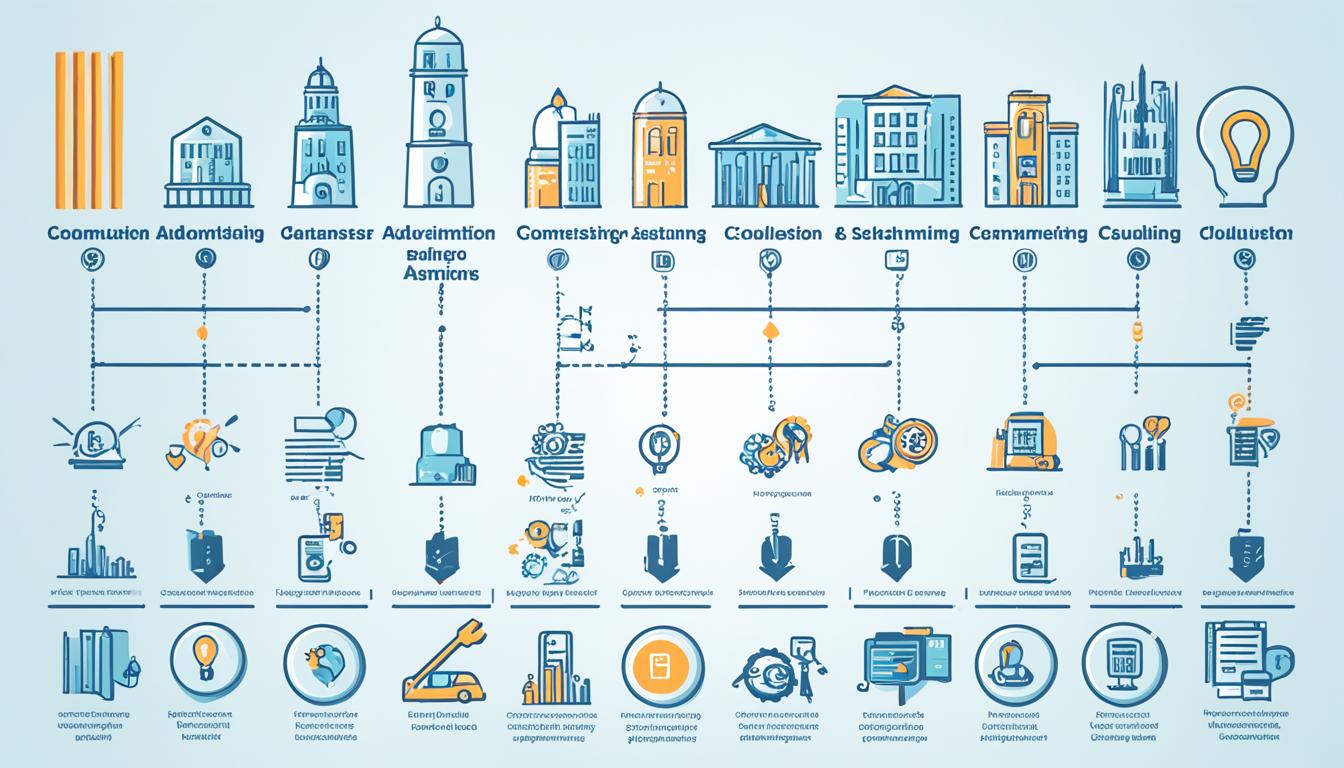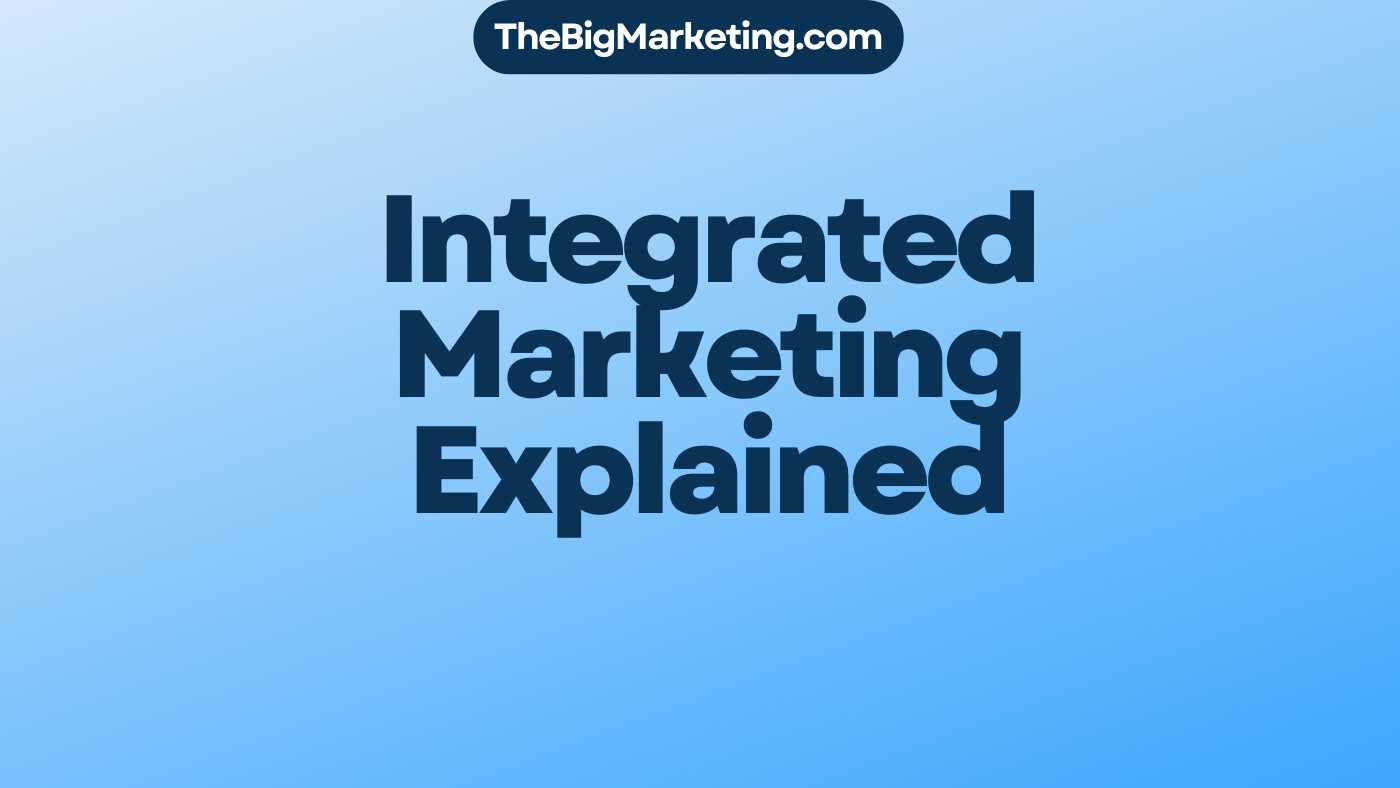CRM software and marketing automation tools are essential for businesses seeking to streamline their operations and boost their sales and marketing efforts. In this comprehensive guide, we will explore the key differences between CRM and marketing automation, compare their functionalities, and discuss the benefits they offer. Whether you are new to CRM and marketing automation or looking to optimize your current systems, this guide will provide valuable insights to help you make informed decisions for your organization.
Key Takeaways:
- CRM and marketing automation serve different purposes but can work together to optimize business processes.
- CRM software focuses on managing customer relationships, tracking sales processes, and improving customer satisfaction.
- Marketing automation tools automate marketing campaigns, lead tracking, and nurturing.
- Integrating CRM with marketing automation enhances efficiency and improves the overall customer experience.
- Top CRM software options include Salesforce Sales Cloud, HubSpot Sales, and Microsoft Dynamics 365 for Sales.
- Top marketing automation platforms include HubSpot, Mailchimp, and GetResponse.
- Evaluating features, user reviews, and pricing options is crucial when selecting CRM software and marketing automation platforms.
Understanding CRM and Marketing Automation
Before we delve into the comparison between CRM and marketing automation, it is crucial to have a clear understanding of these two powerful tools. CRM, or customer relationship management, is a software tool specifically designed to manage customer relationships, track sales and contact information, and enhance agent productivity. It serves as a centralized hub for organizing customer data and streamlining communication between sales teams and customers. By utilizing CRM software, businesses can effectively manage interactions with prospects and existing customers, ultimately improving customer satisfaction and retention.
Marketing automation, on the other hand, focuses on automating and streamlining marketing tasks to optimize efficiency and drive results. It encompasses various functionalities such as lead generation, segmentation, and campaign management. Marketing automation tools allow businesses to automate repetitive tasks, nurture leads, and deliver personalized content, leading to higher conversion rates and improved lead quality. By automating marketing processes, businesses can save time and resources, maximize campaign effectiveness, and gain valuable insights into customer behaviors.
Both CRM and marketing automation play crucial roles in optimizing business processes and enhancing customer experiences. While CRM software is primarily focused on managing customer relationships and improving agent productivity, marketing automation enables businesses to automate and optimize their marketing efforts. Combining CRM and marketing automation can provide a comprehensive solution that integrates customer data, streamlines communication, and enhances customer journeys.
Key Features of CRM:
- Contact management
- Sales pipeline tracking
- Task assignments and reminders
- Customer communication history
- Performance analytics
Key Features of Marketing Automation:
- Lead generation and nurturing
- Email marketing automation
- Segmentation and personalization
- Analytics and reporting
- Campaign management
By incorporating both CRM and marketing automation into your business strategy, you can benefit from a holistic approach to managing customer relationships and optimizing marketing efforts. The integration of these two tools enables businesses to synchronize customer data, track lead interactions, automate marketing campaigns, and make data-driven decisions. Ultimately, the combination of CRM and marketing automation empowers businesses to deliver personalized customer experiences, drive sales growth, and achieve organizational success.
Key Differences Between CRM and Marketing Automation
While CRM and marketing automation share some common functionalities, they serve different purposes within an organization. Understanding these key differences is crucial for choosing the right tool for your business needs.
CRM Functionalities
CRM software primarily focuses on managing customer relationships, tracking sales processes, and improving customer satisfaction. It includes a range of functionalities that aid in optimizing customer interactions and sales performance:
- Contact Management: CRM enables businesses to organize and track customer information, such as names, addresses, and communication history.
- Task Assignments: CRM tools allow for efficient task allocation and management among sales teams, streamlining workflow and ensuring timely follow-ups.
- Sales Pipeline Tracking: By visualizing the sales pipeline, CRM software helps businesses monitor deals and forecast revenue, improving sales efficiency.
Marketing Automation Functionalities
On the other hand, marketing automation tools are geared towards automating marketing campaigns, lead tracking, and nurturing. They come with a variety of functionalities that facilitate efficient marketing processes:
- Email Marketing Automation: Marketing automation platforms enable the creation and automation of email campaigns, delivering personalized content to targeted audiences.
- Lead Scoring: With lead scoring, businesses can identify and prioritize qualified leads based on their engagement and interaction with marketing campaigns.
- Campaign Analytics: Marketing automation software provides analytics and insights into campaign performance, allowing businesses to make data-driven decisions for future marketing strategies.
By understanding these distinctive functionalities, businesses can better evaluate which tool aligns with their specific goals and requirements.
Benefits of CRM Software
Implementing a CRM software brings several benefits to businesses. It plays a crucial role in improving customer relationships, enhancing sales team performance, and increasing overall productivity. With a CRM system in place, organizations can efficiently organize and manage customer data, ensuring easy access to essential information.
One of the significant advantages of CRM software is its ability to provide a centralized platform for customer data. By having all customer interactions, purchase history, and contact information in one place, businesses can gain a comprehensive view of their customers and deliver personalized experiences.
A CRM platform also enables businesses to set reminders for important tasks, ensuring that no follow-up opportunities are missed. With automated reminders, sales representatives can stay on top of their schedules and engage with customers at the most appropriate time.
Another key benefit of CRM software is its ability to automate time-consuming processes. By automating repetitive tasks such as data entry, lead qualification, and communication workflows, businesses can save valuable time and resources, allowing their sales team to focus on higher-value activities.
Furthermore, CRM systems empower businesses to offer targeted promotional content based on customer preferences and behaviors. By leveraging customer data, businesses can create personalized marketing campaigns and deliver the right message to the right audience, increasing engagement and conversion rates.
A CRM platform also provides insights into customer journeys, allowing businesses to track interactions and identify opportunities for upselling or cross-selling. By understanding the customer’s path, businesses can tailor their offerings and provide relevant recommendations, enhancing customer satisfaction and loyalty.
Ultimately, CRM software helps optimize customer interactions, increase conversion rates, and drive sales growth. By leveraging its benefits, businesses can streamline their operations, enhance customer experiences, and build long-lasting relationships.
Key Benefits of CRM Software:
- Improved customer relationships
- Enhanced sales team performance
- Increased productivity
- Centralized customer data
- Automated task reminders
- Time-saving automation
- Targeted promotional content
- Insights into customer journeys
- Optimized customer interactions
- Increased conversion rates
- Driving sales growth
Features of Marketing Automation
Marketing automation software offers a diverse range of features and capabilities that simplify marketing processes and enhance overall efficiency. These comprehensive tools empower businesses to generate qualified leads, improve customer engagement, and drive marketing ROI. Let’s explore some of the key features and capabilities of marketing automation:
1. Lead Generation and Nurturing
Marketing automation platforms provide robust lead generation and nurturing capabilities. Through various strategies such as website forms, landing pages, and social media campaigns, businesses can capture valuable lead information. Automation tools enable seamless lead nurturing by delivering targeted and personalized content, nurturing leads from awareness to conversion.
2. Email Automation
Email marketing is an integral part of any marketing strategy, and marketing automation platforms excel in streamlining email campaigns. With automation, marketers can set up personalized email sequences, send automated follow-ups, and trigger emails based on customer behaviors. This ensures timely and relevant communication with prospects and customers, thereby enhancing engagement and conversion rates.
3. Segmentation
Segmentation is essential for targeting specific audiences with tailored messages. Marketing automation tools allow businesses to segment their audience based on various criteria such as demographics, behavior, and engagement. This enables marketers to create targeted campaigns that resonate with each segment, improving the effectiveness of their marketing efforts.
4. Analytics and Reporting
Data-driven decision-making is crucial for success in marketing. Marketing automation platforms provide advanced analytics and reporting features that offer insightful data on campaign performance, audience engagement, and conversion metrics. By leveraging these analytics, marketers can identify trends, optimize campaigns, and drive continuous improvement.
5. Personalized Content Delivery
Personalization is now an expectation for consumers. Marketing automation allows marketers to deliver personalized content to their audience at scale. By utilizing data from customer interactions, preferences, and behaviors, businesses can deliver relevant content to enhance customer experiences and build stronger relationships.
These marketing automation features provide businesses with the necessary tools to streamline marketing efforts, automate repetitive tasks, and deliver personalized experiences to their audience. By leveraging these capabilities, businesses can drive customer engagement, increase conversion rates, and achieve substantial marketing success.
Combining CRM and Marketing Automation
Integrating CRM with marketing automation can bring significant benefits to businesses, enhancing efficiency and improving the overall customer experience. By combining these two systems, you can leverage their unique functionalities to streamline processes and achieve better results.
One of the key advantages of integrating CRM with marketing automation is the ability to assign lead scores. This allows you to prioritize and focus on leads that have a higher chance of conversion, enabling your sales team to be more efficient in their efforts.
Nurturing prospect relationships is another critical aspect that can be enhanced through integration. By automating personalized communication and delivering relevant content to prospects based on their interests and behaviors, you can build stronger relationships and increase the likelihood of conversions.
Integration also provides valuable analytical insights. By combining data from both CRM and marketing automation systems, you can gain a comprehensive view of your customers and prospects. This enables you to make data-driven decisions, identify trends, and optimize marketing campaigns for better results.
Visualizing lead journeys is another advantage of integrating CRM with marketing automation. By tracking customer interactions and touchpoints across multiple channels, you can understand their buying journey better and tailor your marketing strategies accordingly.
Improved communication between sales and marketing teams is another significant benefit. Sharing customer data, insights, and campaign performance metrics fosters collaboration and alignment between these two crucial departments.
Integration also enables seamless access to all customer data through one solution. This eliminates the need for manual data entry and reduces the risk of data duplication or discrepancies. It ensures that both sales and marketing teams have a centralized and up-to-date view of customer information.
Maximizing the benefits of both CRM and marketing automation through integration can lead to enhanced business processes, improved customer engagement, and increased sales effectiveness.
| Benefits of Integrating CRM with Marketing Automation | Key Features |
|---|---|
| Assign lead scores | Automate personalized communication |
| Nurture prospect relationships | Deliver relevant content |
| Gain valuable analytical insights | Visualize lead journeys |
| Improve communication between sales and marketing teams | Centralized access to customer data |
Best CRM Software Options
When it comes to selecting CRM software for your business, it’s crucial to consider various factors such as functionality, ease of use, customization options, and pricing. Fortunately, there are several top CRM platforms available that offer comprehensive solutions to meet your specific needs. Let’s take a look at some of the best CRM software options:
| CRM Software | Key Features |
|---|---|
| Salesforce Sales Cloud |
|
| HubSpot Sales |
|
| Microsoft Dynamics 365 for Sales |
|
Exploring the features, reviews, and ratings of these CRM platforms can help you make an informed decision and find the best fit for your business. Remember to consider your specific requirements and goals to ensure the CRM software aligns with your organization’s needs.

Top Marketing Automation Platforms
To effectively harness the power of marketing automation, selecting the right platform for your business is essential. Here are some of the top marketing automation platforms that can help you streamline your marketing efforts:
1. HubSpot
HubSpot is a leading marketing automation platform that offers a comprehensive suite of tools to automate and optimize your marketing campaigns. Along with its marketing automation capabilities, HubSpot also provides a free CRM package, allowing seamless integration between your marketing and sales teams. With features like lead generation, email marketing automation, and campaign analytics, HubSpot empowers businesses to effectively engage with their audience and drive results.
2. Mailchimp
Mailchimp is a popular web-based marketing platform known for its intuitive interface and powerful automation features. With Mailchimp, you can create and automate email marketing campaigns, segment your audience, and track campaign performance. The platform also offers additional features like landing page creation, social media integration, and audience insights, making it a versatile marketing automation tool for businesses of all sizes.
3. GetResponse
GetResponse is a cloud-based email marketing and automation tool designed to help businesses effectively manage their marketing efforts. With features like autoresponders, email marketing automation, and landing page creation, GetResponse simplifies the process of nurturing leads and driving conversions. The platform also provides analytics and reporting capabilities, allowing businesses to measure the impact of their marketing campaigns and make data-driven decisions.
When evaluating marketing automation platforms, it’s important to consider factors such as features, pricing, ease of use, and customer reviews. By choosing the right platform for your business, you can automate your marketing processes, enhance customer engagement, and achieve your marketing goals.
Conclusion
CRM and marketing automation are powerful tools that enhance businesses by improving customer relationships, driving sales growth, and streamlining marketing processes. While they have distinct functionalities, integrating CRM with marketing automation can result in even greater efficiency and business outcomes. By leveraging the benefits of both systems, businesses can optimize customer interactions, effectively nurture leads, and measure marketing ROI.
When selecting CRM software and marketing automation platforms, it is essential to consider the specific needs and goals of your organization. Evaluating features, user reviews, and pricing options can help you make informed choices that align with your business objectives.
CRM software facilitates effective customer relationship management, enabling businesses to organize customer data, track sales processes, and offer targeted promotional content. It enhances customer satisfaction and boosts sales team performance, ultimately driving sales growth. On the other hand, marketing automation streamlines marketing tasks, such as lead generation, segmentation, and campaign management. It automates repetitive tasks, delivers personalized messaging, and analyzes campaign performance, enabling businesses to generate qualified leads and improve customer engagement.
Integrating CRM with marketing automation allows for seamless collaboration, assigning lead scores, nurturing prospects, gaining valuable analytical insights, and improving communication between sales and marketing teams. This integration provides a comprehensive solution to manage customer data, enhance efficiency, and optimize the overall customer experience.
FAQ
What is the difference between CRM and marketing automation?
CRM focuses on managing customer relationships and sales processes, while marketing automation streamlines marketing tasks and campaign management.
What are the benefits of CRM software?
CRM software helps improve customer relationships, enhance sales team performance, increase productivity, and optimize customer interactions.
What are the key features of marketing automation?
Marketing automation software offers features such as lead generation and nurturing, email automation, segmentation, analytics, and personalized content delivery.
How can CRM and marketing automation be integrated?
Integrating CRM with marketing automation allows for lead scoring, prospect relationship nurturing, analytical insights, and improved communication between sales and marketing teams.
What are some of the best CRM software options?
Some top CRM software options include Salesforce Sales Cloud, HubSpot Sales, and Microsoft Dynamics 365 for Sales.
Which are the top marketing automation platforms?
Some top marketing automation platforms are HubSpot, Mailchimp, and GetResponse.

